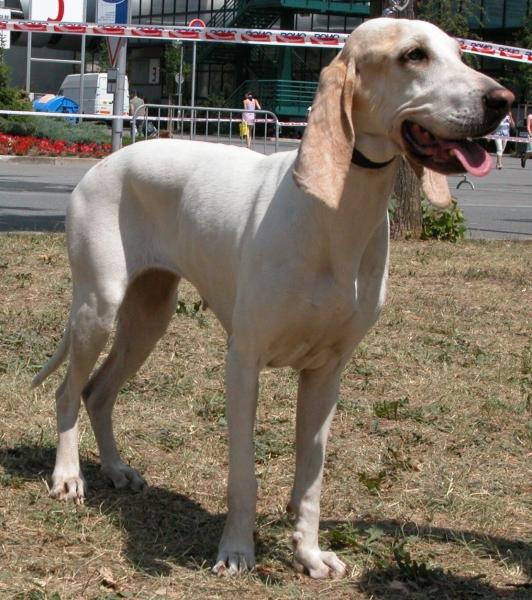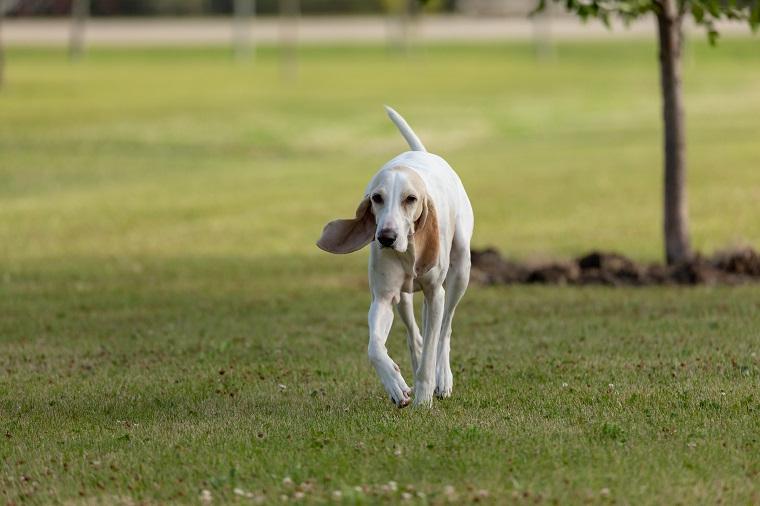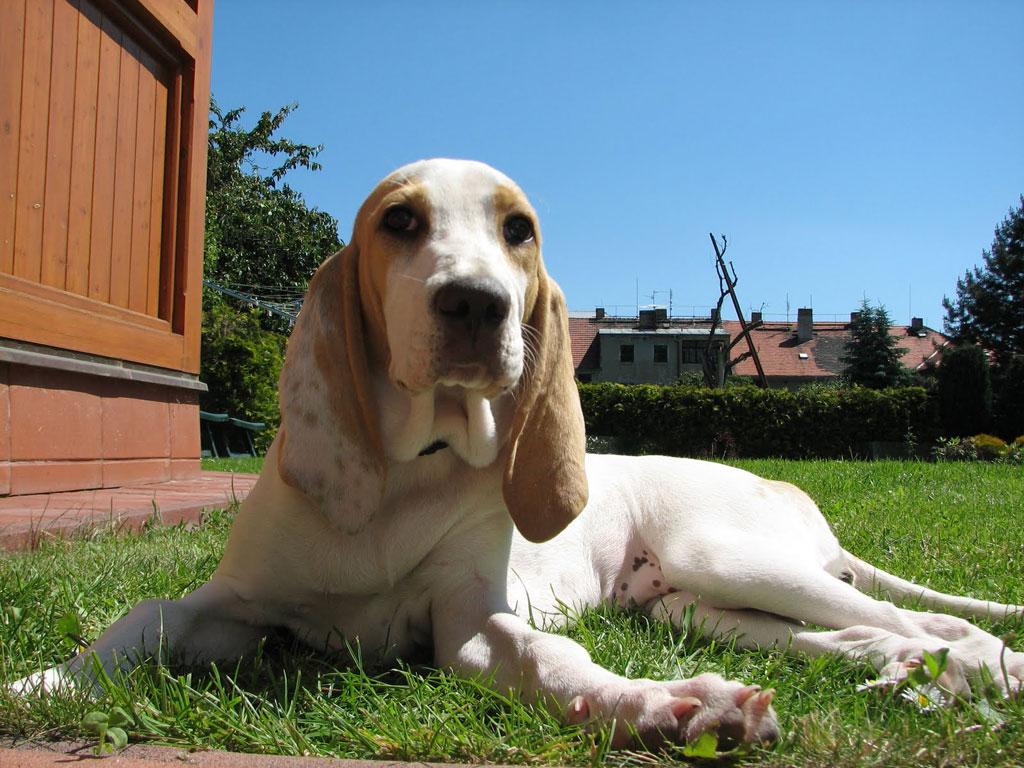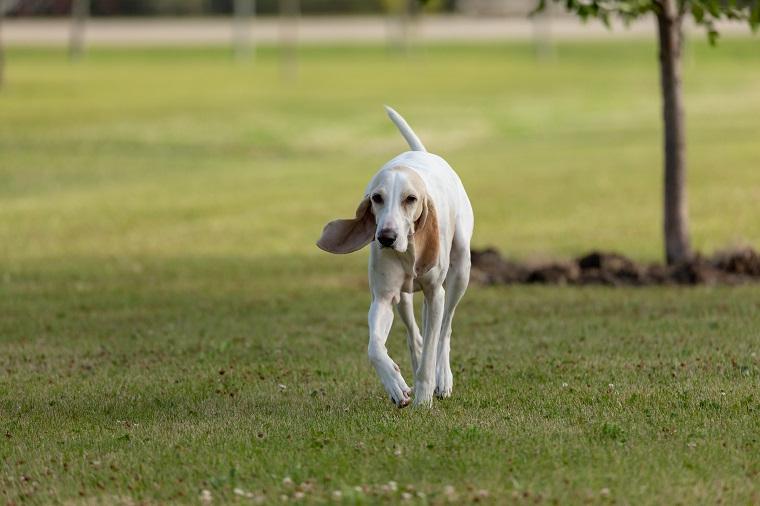- Breed Category: Scenthound
- Country of Origin: France
- Average Height: 53-58 cm (21-23 in)
- Average Weight: 25-28 kg (55-62 lbs)
- Average Life Span: 12-14 years
- Grooming Requirements: Low, occasional brushing
- Exercise Requirements: High, needs daily exercise
- Coat Type: Short and smooth
- Coat Color Variations: White with orange spots
- Shedding Level: Moderate
- Ear Type: Long and floppy
- Tail Type: Long and tapered
- Temperament: Friendly, energetic, intelligent
- Intelligence Level: High
- Barking Tendency: Moderate
- Compatibility with Children: Good, very friendly
- Compatibility with Other Pets: Generally good
- Training Ease: Moderate, can be stubborn
- Common Health Issues: Hip dysplasia, ear infections
- Dietary Needs: High-quality dog food
- Energy Level: High
- Drooling Tendency: Low
- Sensitivity to Weather: Sensitive to cold
- Overall Maintenance Level: Moderate
- Original Purpose: Hunting hare and small game
- Year of Recognition by Kennel Clubs: 1975
- Apartment Friendly: Not ideal, needs space
- Best Suited For: Active families, rural settings
- Cost of Ownership: Moderate
- Unique Traits: Distinctive white coat, keen nose
When you think of hunting dogs, the Porcelaine might not be the first breed that comes to mind. Yet, this elegant and rare breed has a rich history and unique characteristics that make it stand out. Known for their striking white coat with orange spots, Porcelaines are not just a pretty face. They are skilled scent hounds, originally bred in France for hunting small game. This article aims to delve into the fascinating world of the Porcelaine dog, exploring their history, distinctive traits, and how best to care for them. Whether you’re considering adding one to your family or simply curious, understanding this breed can offer insights into their loyal and energetic nature.
History and Origin of the Porcelaine Dog Breed

Early Development of the Breed
The Porcelaine dog, with its roots tracing back to the 18th century, is a breed that emerged in France. It was developed by crossing various scent hounds, aiming to create a dog with exceptional hunting abilities and a distinctive appearance. The breed’s name, “Porcelaine,” is inspired by its glossy, porcelain-like coat, which is both eye-catching and practical for hunting.
Role in Hunting and Tracking
Porcelaines were primarily bred for hunting small game, such as hare and rabbit. Their keen sense of smell and agile nature made them perfect companions for hunters. These dogs are known for their ability to track scents over long distances, making them invaluable in the field. Their stamina and determination are unmatched, allowing them to pursue game tirelessly.
Key Historical Figures and Regions
The breed’s development is closely linked to the French nobility, who sought to create a superior hunting dog. Regions like Franche-Comté played a significant role in refining the breed. Over time, the Porcelaine’s reputation spread beyond France, capturing the interest of hunting enthusiasts across Europe.
Physical Characteristics of the Porcelaine Dog

Appearance
The Porcelaine dog is a medium-sized breed, typically weighing between 25 to 28 kilograms and standing about 53 to 58 centimetres tall at the shoulder. Their coat is short, smooth, and predominantly white, adorned with striking orange spots that give them a distinctive and elegant look. These markings are not just for show; they help the dog blend into its natural surroundings while hunting.
Unique Physical Traits
One of the most notable features of the Porcelaine is its sleek and athletic build. This breed is designed for endurance and agility, with a body that allows for swift and graceful movement. Their long, slender legs and deep chest contribute to their impressive stamina, making them excellent companions for active pursuits. The Porcelaine’s ears are long and droopy, adding to their charming appearance, while their expressive eyes convey intelligence and alertness.
Temperament and Behaviour of the Porcelaine Dog

Typical Personality Traits
Porcelaine dogs are known for their gentle and intelligent nature. They possess a high energy level, making them perfect for active families or individuals who enjoy outdoor activities. Their intelligence means they are quick learners, but it also requires consistent training to keep them engaged and well-behaved.
Suitability as a Family Pet and Hunting Companion
As family pets, Porcelaines are affectionate and loyal, forming strong bonds with their human companions. Their hunting background means they thrive in environments where they can exercise their natural instincts. Whether you’re looking for a family pet or a hunting partner, their versatility makes them an excellent choice.
Interaction with Children and Other Animals
Porcelaines generally get along well with children, thanks to their gentle disposition. They are patient and tolerant, making them suitable for families with young kids. However, their hunting instincts mean they may not always be the best fit with smaller pets unless properly socialised from a young age.
Training and Exercise Needs of the Porcelaine Dog
Importance of Early Training and Socialisation
Starting training and socialisation early is crucial for Porcelaine dogs. These intelligent hounds benefit from exposure to various environments, people, and other animals to develop into well-rounded companions. Early socialisation helps curb their natural hunting instincts, making them more adaptable to family life.
Recommended Training Techniques
Positive reinforcement is the key to training Porcelaines. They respond well to rewards and praise, which keeps them motivated and eager to learn. Consistency is important, as these dogs are quick learners but can become bored if not challenged. Incorporating fun and engaging activities into training sessions can help maintain their interest.
Daily Exercise Requirements and Activities They Enjoy
Porcelaines are energetic dogs that require daily exercise to stay healthy and happy. A mix of long walks, playtime, and mental stimulation is ideal. They enjoy activities like scent work, agility courses, and fetch, which allow them to use their natural skills. Regular exercise not only keeps them fit but also helps prevent behavioural issues stemming from boredom.
Health and Lifespan of the Porcelaine Dog

Common Health Issues
Porcelaine dogs are generally healthy, but like any breed, they can be prone to certain health issues. Hip dysplasia is one concern, given their active nature. Regular vet check-ups can help catch this early. Ear infections are another common issue due to their long, droopy ears, so regular cleaning is essential.
Average Lifespan and Health Tips
With proper care, Porcelaines typically live between 12 to 14 years. Keeping them healthy involves a balanced diet, regular exercise, and mental stimulation. These dogs thrive on activity, so ensure they get plenty of opportunities to run and play. Mental challenges like puzzle toys can also keep their sharp minds engaged.
Preventative Care Recommendations
- Regular vet visits for vaccinations and health screenings.
- Maintain a healthy weight through a balanced diet and exercise.
- Routine dental care to prevent gum disease.
- Consistent ear cleaning to avoid infections.
- Flea and tick prevention, especially if they spend time outdoors.
Grooming and Maintenance of the Porcelaine Dog
Coat Care and Grooming Routines
The Porcelaine’s coat is short and smooth, making grooming relatively straightforward. A weekly brush is usually enough to keep their coat looking its best. This not only helps remove loose hair but also distributes natural oils, keeping their skin healthy. A soft-bristle brush or grooming mitt works well for this breed.
Shedding and Seasonal Grooming Tips
Porcelaines are moderate shedders, with shedding increasing during seasonal changes. During these times, brushing a few times a week can help manage the extra hair. Bathing should be occasional, only when necessary, to avoid stripping their coat of essential oils. Always use a dog-specific shampoo to maintain their skin’s natural balance.
Regular grooming sessions are also a great opportunity to check for any skin issues or parasites. Keeping their ears clean and nails trimmed is essential, as their long ears can trap dirt and moisture, leading to infections. A little maintenance goes a long way in keeping your Porcelaine looking and feeling great.
Diet and Nutrition for the Porcelaine Dog

Nutritional Needs for Optimal Health
Porcelaine dogs, with their active lifestyle, need a diet rich in high-quality proteins and healthy fats. These nutrients support their muscle development and energy levels. Look for dog foods that list meat as the first ingredient, ensuring your Porcelaine gets the best nutrition possible.
Foods to Include and Avoid
Include lean meats, fish, and vegetables in their diet. These provide essential vitamins and minerals. Avoid foods with artificial additives, fillers, and excessive grains, as these can lead to allergies and digestive issues. Fresh water should always be available to keep them hydrated.
Feeding Schedules and Portion Recommendations
Feed your Porcelaine twice a day, once in the morning and once in the evening. This helps maintain their energy levels throughout the day. Portion sizes depend on their age, weight, and activity level, so consult your vet for tailored advice. Overfeeding can lead to obesity, so monitor their weight regularly.
Fun Facts and Trivia about the Porcelaine Dog

Interesting Tidbits about the Breed
Porcelaine dogs are often mistaken for Dalmatians due to their striking white coats with orange spots. However, their history and purpose are quite different. These dogs were bred specifically for hunting, and their unique coat helps them blend into their surroundings, making them excellent at sneaking up on prey.
Despite their hunting prowess, Porcelaines are known for their gentle nature. They are often described as “gentle giants” due to their calm demeanour and affectionate behaviour towards their families. This makes them a great choice for those looking for a dog that can be both a hunting companion and a family pet.
Famous Porcelaine Dogs in Media or History
While Porcelaine dogs may not be as famous as some other breeds, they have made their mark in history. They were favoured by French nobility, who prized them for their hunting skills and elegant appearance. This royal connection has given them a certain prestige among hunting breeds.
In media, Porcelaines have occasionally appeared in French films and literature, often depicted as loyal hunting companions. Their unique look and history make them a fascinating subject for storytellers and dog enthusiasts alike.
Final Thoughts

The Porcelaine dog is a unique blend of elegance and functionality. With its rich history and distinctive traits, this breed offers both beauty and utility. Porcelaines are not only skilled hunters but also affectionate family companions, requiring active engagement and consistent care. Embracing a Porcelaine means welcoming a loyal, energetic partner into your life. Consider this remarkable breed if you’re ready for an active, rewarding relationship with a devoted canine friend.
